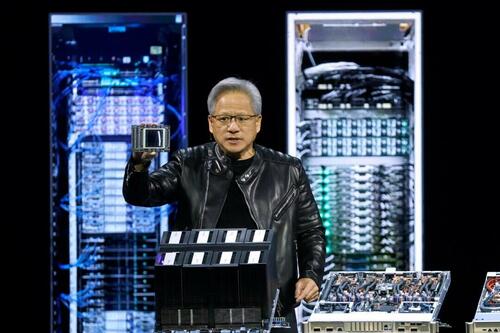World’s Most Advanced AI Chips Now Being Made In America Due To Trump’s Policies: Nvidia Chief
Authored by Tom Ozimek via The Epoch Times,
Nvidia CEO Jensen Huang said the United States has entered a new “industrial revolution” powered by artificial intelligence, crediting President Donald Trump’s tariff policies and manufacturing agenda for enabling the first-ever production of the company’s most advanced Blackwell AI chips on American soil.
While speaking from a semiconductor fabrication plant in Phoenix, Arizona, on Oct. 17, and later during an interview with Fox News, Huang said that Nvidia and Taiwan Semiconductor Manufacturing Co. (TSMC) have jointly reached volume production of U.S.-made Blackwell wafers—an achievement he called “a historic moment” in both technology and industrial policy.
“It’s the very first time in recent American history that the single most important chip is being manufactured here in the United States by the most advanced fab, by TSMC, here in the United States,” Huang said at the event.
“This is the vision of President Trump of reindustrialization—to bring back manufacturing to America, to create jobs, of course, but also, this is the single most vital manufacturing industry and the most important technology industry in the world.”
The milestone was marked in a ceremony at the Arizona fab, where Huang joined TSMC executives to sign the first U.S.-produced Blackwell wafer—a symbolic gesture meant to highlight the reemergence of cutting-edge semiconductor production in the United States.
In his Fox News interview, Huang credited Trump’s tariffs and energy policies with speeding up the decision to manufacture advanced chips in the United States rather than keeping production overseas.
“This last week was a historic week,” he said on “The Sunday Briefing.”
“We manufactured the most advanced AI chips in the world, in the most advanced fab in the world, here in America for the first time. All of this started with President Trump wanting to reindustrialize the United States. His tariffs were a pressing agent in making this possible at the speed that we’re doing, and now just shortly after less than a year, we’re now manufacturing the most advanced chips for AI here in the United States. This is just the beginning of it.”
Trump has made tariffs the centerpiece of a broader industrial strategy aimed at reshaping global supply chains and reducing reliance on foreign manufacturing. Since returning to the White House, he has imposed a range of duties on imports—from steel and aluminum to vehicles and electronics—while noting that companies can avoid tariffs entirely by building in the United States.
Trump administration officials have said the goal of the tariffs is not only to raise federal revenue but also to force corporate investment back onto U.S. soil—a stance that has drawn both manufacturing commitments and legal challenges.
Huang estimated that within several years, roughly $500 billion worth of AI supercomputing systems could be built and installed in the United States, including data centers, chip fabs, and advanced packaging plants. He said the scale of construction would also generate demand for skilled trades such as electricians, welders, and precision technicians.
With his remarks, Huang joins other business leaders who have recently endorsed Trump’s tariff approach as a catalyst for reshoring. Whirlpool CEO Marc Bitzer, for example, said recently that tariffs helped justify a $300 million expansion of its Ohio manufacturing plants, calling the policies essential to a “level playing field.”
“Any investment is a bet for the future,” Bitzer said. “Our bet is that these tariff policies stay.”
Meanwhile, Trump’s trade program faces a pivotal test at the U.S. Supreme Court, which is set to hear arguments next month on whether the administration exceeded its authority in imposing certain tariffs under emergency powers.
Trump has said that overturning the tariffs would jeopardize national security and undermine U.S. leverage abroad, saying during an Oct. 19 interview, “If they took away tariffs, then they’ve taken away our national security,” adding that an unfavorable ruling could mean the United States will struggle “for years.”
Tyler Durden
Mon, 10/20/2025 – 15:30ZeroHedge NewsRead More





 R1
R1
 T1
T1


